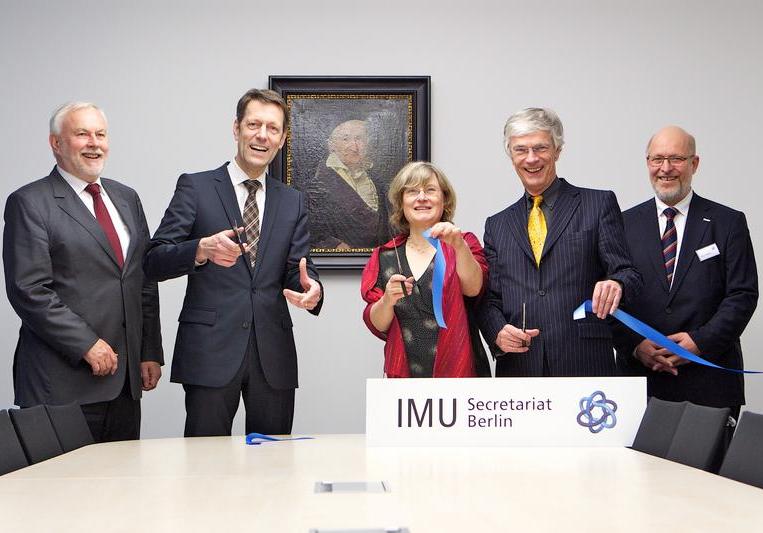On 1 February, the International Mathematical Union (IMU) has opened its first permanent office in Berlin. Its secretariat is now located in the Weierstrass Institute for Applied Analysis and Stochastics (WIAS) near Gendarmenmarkt in the center of Berlin.
For the first time the IMU is setting up a permanent office. Until now, the office has been moving and has been at the country of its secretary. During a multi-stage selection procedure, Berlin as a location prevailed over bids from Toronto, Rio de Janeiro, and other places.
IMU President Prof. Ingrid Daubechies of Duke University (USA) said she was enthused about the new location: ``With this stable office in Berlin, the IMU has found a permanent home for the first time. I thank the Federal Republic of Germany and the Land of Berlin for their generous support, and I am sure that the embedding of the secretariat into the rich mathematical landscape of Berlin will lead to the professional support of its work that the IMU is hoping for.‘‘ The current IMU Secretary isProf. Martin Grötschel of Technische Universität and Zuse Institute Berlin. He will be the first one to move into the new office, which will be headed by the Deputy Director of the Weierstrass Institute (WIAS), Prof. Alexander Mielke.
Dr. Georg Schütte, State Secretary of the Federal Ministry of Education and Research (BMBF) underlined during the opening ceremony: ``Mathematics contributes to an ever increasing extent to the solution of applied problems. Even if Germany has an outstanding basis for an intensive use of mathematics, we do not want to rest content with this status quo, but we want to initiate a dialogue about the directions into which mathematics should develop in the future and to estimate future social demand for mathematics. I value the living network of the IMU as a guarantee to unleash these potentials of mathematics. For this reason the Federal Government and the Land of Berlin support the IMU in its future work in the German capital.‘‘
The BMBF and the Berlin Senate support the IMU office at equal parts with half a million euros per year. The Berlin Science Senator Prof. Jürgen Zöllner said: ``The heart of world mathematics is now beating in the centre of Germany‘s capital. We see this special honour for Berlin and its mathematics as a reward, an incentive, and an obligation, in equal measure, for this town.‘‘
The IMU supports international collaboration in all fields of mathematics. Every four years, it organises the International Congress of Mathematicians, where it also awards the Fields medals, the ``Nobel Prize in mathematics’’, for outstanding results of mathematical research. The IMU establishes the necessary structures in developing countries to allow as many talented mathematicians as possible to develop their skills. Last but not least, the IMU promotes a positive image of mathematics among the public and is also devoted to improving the teaching of mathematics in schools and universities.
Karl Ulrich Mayer, President of the Leibniz Association, is pleased with the success of WIAS: ``The Leibniz Association is proud of WIAS and congratulates the institute on its achievement. Special thanks are due to the Federal Ministry of Education and Research and the Berlin Senate who support the office, as well as to the Einstein Foundation and to the German Mathematical Society (DMV).‘‘ The successful Berlin bid for the permanent office of the International Mathematical Union is essentially based on the excellent collaboration of the Berlin mathematical institutions, which can be seen, e. g., in the DFG Research Centre MATHEON. This example shows once again the close collaboration of Leibniz institutes with universities.
Contact:
| Weierstraß-Institut für Angewandte Analysis und Stochastik (WIAS) Dr. Torsten Köhler Mohrenstr. 39 10117 Berlin Tel. 030 20372-582 Fax 030 2044975 E-Mail: torsten.koehler@wias-berlin.de |
More information:
www.wias-berlin.de
www.mathunion.org


